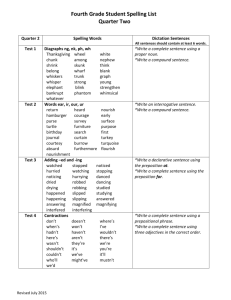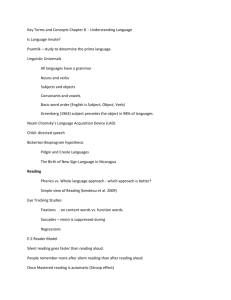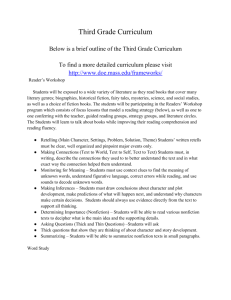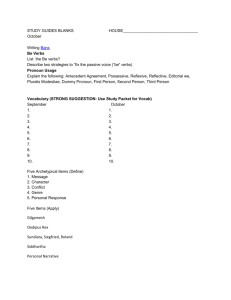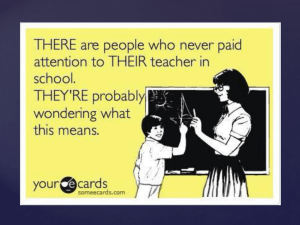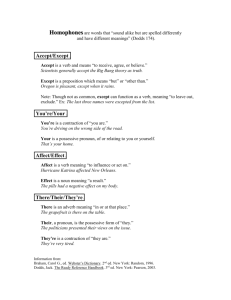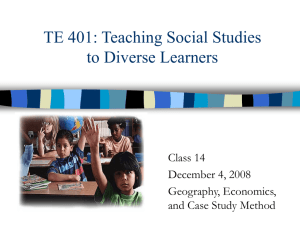Unit 5 Vocabulary and Skills
advertisement
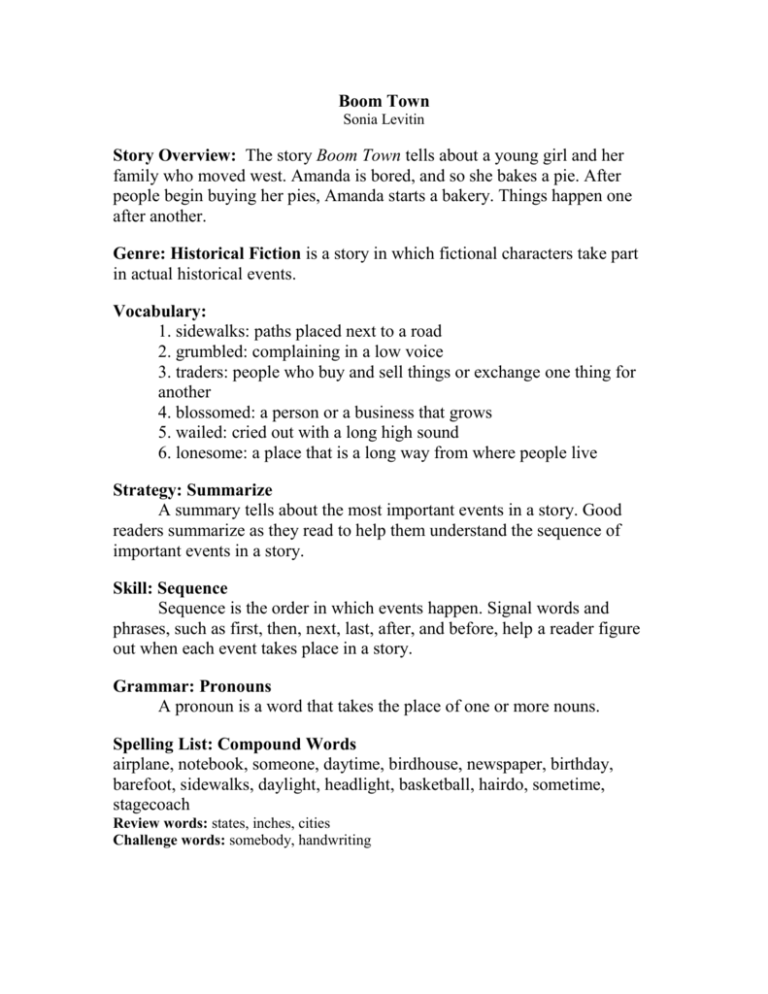
Boom Town Sonia Levitin Story Overview: The story Boom Town tells about a young girl and her family who moved west. Amanda is bored, and so she bakes a pie. After people begin buying her pies, Amanda starts a bakery. Things happen one after another. Genre: Historical Fiction is a story in which fictional characters take part in actual historical events. Vocabulary: 1. sidewalks: paths placed next to a road 2. grumbled: complaining in a low voice 3. traders: people who buy and sell things or exchange one thing for another 4. blossomed: a person or a business that grows 5. wailed: cried out with a long high sound 6. lonesome: a place that is a long way from where people live Strategy: Summarize A summary tells about the most important events in a story. Good readers summarize as they read to help them understand the sequence of important events in a story. Skill: Sequence Sequence is the order in which events happen. Signal words and phrases, such as first, then, next, last, after, and before, help a reader figure out when each event takes place in a story. Grammar: Pronouns A pronoun is a word that takes the place of one or more nouns. Spelling List: Compound Words airplane, notebook, someone, daytime, birdhouse, newspaper, birthday, barefoot, sidewalks, daylight, headlight, basketball, hairdo, sometime, stagecoach Review words: states, inches, cities Challenge words: somebody, handwriting Beatrice’s Goat Page McBrier Story Overview: We’re reading the story Beatrice’s Goat. A girl named Beatrice longs to go to school, but her family does not have the money to send her. Then her family is given a goat. The goat gives birth, and Beatrice begins to sell her goat’s milk. Then Beatrice gets money. Genre: Narrative Nonfiction is a story that gives facts about actual people or situations. Vocabulary: 1. gift: something that is given to someone on a special occasion or as a thank you 2. yearned: to do something you wanted to do very much 3. tend: to take care of something 4. produce: to make something 5. sturdy: strong 6. schoolhouse: a building used as a school 7. kindhearted: a person cares about others Strategy: Making Inferences Good readers use their experiences and story clues to figure out information the author has left out. This is called making inferences. Skill: Cause and Effect A cause is an action that makes something happen. An effect is something that happens because of an action. Sometimes readers can use signal words, such as because, due to, and as a result, to find a cause and effect. Sometimes they will have to make inferences to figure it out. Grammar: Subject and Object Pronouns A pronoun is a word that takes the place of one or more nouns. A subject pronoun is used as the subject of a sentence. A subject pronoun must match the subject it replaces. Spelling List: Words with Inflected Endings names, hoping, dropped, named, dances, dropping, naming, danced, wraps, hopes, dancing, wrapped, hoped, drops, wrapping Review words: airplane, someone, newspaper Challenge words: driving, traded A Carousel of Dreams Time for Kids Story Overview: We’re reading “A Carousel of Dreams.” It’s an article about carousels. The writer says that one carousel is the most fantastic in the nation. That’s just his opinion—it can’t be proved. There are facts, too. For Parks in New York City, kids’ drawings were used to make the animals on the carousel. Genre: Nonfiction Article gives information about a real person, place, or event. Vocabulary: 1. powered: supplied with a source of energy 2. declared: when a statement is firmly said 3. existed: anything that once lived could now be found 4. artist’s: paintbrush is a paintbrush that belongs to that artist 5. pride: a feeling of satisfaction in doing something well Strategy: Making Inferences and Analyze Good readers use their own experiences and clues in the article to figure out information the author has left out. This is called making inferences and analyzing. It helps the reader understand the article and make better predictions. Skill: Fact and Opinion Facts are statements that can be proved to be true. Opinions show what a person or group believes, thinks, or feels about something. Grammar: Possessive Pronouns A possessive pronoun takes the place of a possessive noun. A possessive pronoun shows who or what owns something. Spelling List: Words Endings with y to I tries, drying, studied, tried, hurries, studying, trying, hurried, plays, dries, hurrying, played, dried, studies, playing Review words: dances, hoping, wrapping Challenge words: obeyed, worrying The Printer Myron Uhlberg Story Overview: The Printer is a story about a man who is deaf. He is a printer. Although he knows how to talk with his hands, the other printers do not know sign language. One day a fire begins back in a corner, and the man does not know how to tell anyone. Genre: Realistic Fiction is an invented story that could have happened in real life. Vocabulary: 1. screamed: to cry out loudly 2. numb: unable to move or feel 3. escape: to get away 4. fled: to run away 5. shuddered: shook or trembled from fear 6. image: a picture in your mind 7. newspaper: a set of pages that have the news printed on them Strategy: Making Inferences Good readers use their own experiences and clues in the story to figure out information the author has left out in order to make predictions about what will happen next. This is called making inferences. Skill: Make and Confirm Predictions When readers make predictions, they make inferences using story clues and their own experiences to tell what they think will happen next. As they read, they will confirm or revise the predictions. Grammar: Pronoun-Verb Agreement A present-tense verb must agree with its subject pronoun. Spelling List: The VC/CV Pattern basket, bedtime, follow, rabbit, mammal, problem, napkin, number, chicken, letter, fellow, butter, invite, chapter, Sunday Review words: tried, studies, drying Challenge words: splendid, complete Animal Homes Ann O. Squire Story Overview: We’re reading “Animal Homes” in class. The author is very good at describing animal homes. When she talks about honeybees, she says that the hive is made of waxy, six-sided cubicles. Genre: Informational Nonfiction is a detailed explanation of real things using facts. Vocabulary: 1. hives: where bees live 2. architects: people who plan and design houses and other buildings 3. structures: another word for building 4. contain: to hold 5. retreats: to turn back 6. shallow: not deep 7. shelter: something that protects or covers Strategy: Summarize A summary is a short statement of the most important ideas in a selection. Summarizing helps readers understand and remember what they read. Skill: Description Description is a nonfiction text structure in which the author introduces a topic and gives a list of characteristics or qualities that describe the topic. Grammar: Pronoun-Verb Contractions A contraction is a shortened form of two words. An apostrophe replaces letters that are left out in a pronoun-verb contraction. Spelling List: The V/CV and VC/V Pattern pilot, planet, label, diner, model, cozy, tiger, shady, silent, favor, robot, spider, lemon, tiny, frozen Review words: follow, basket, Sunday Challenge words: melon, stomach
